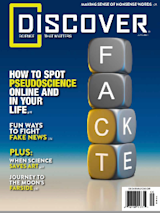COVID-19 isn’t the only thing that spread like wildfire in 2020 — so did the conspiracy theories about it. Misleading claims that the virus was a political hoax or that the vaccines harbor microchips to allow the government to surveil its citizens blazed across social media. By December, Facebook, Twitter and YouTube had banned COVID-19 vaccine misinformation on their platforms. But this flare-up of falsehoods wasn’t just harmless noise.
A survey by the Pew Research Center last November found that 21 percent of U.S. adults don’t plan on getting vaccinated, and remain “pretty certain” that more information won’t change their mind. It’s troubling to think that simply debunking these claims — essentially, exposing them as untrue — is not enough to shift some people’s perceptions. But what if there was a way to prime people to spot disinformation before they see it? In other words, what if there was a ...
















